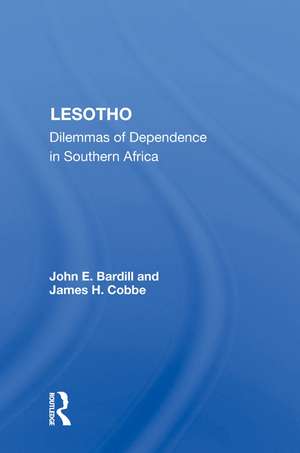Lesotho: Dilemmas of Dependence in Southern Africa
Autor John E. Bardillen Limba Engleză Hardback – 7 iun 2019
| Toate formatele și edițiile | Preț | Express |
|---|---|---|
| Paperback (1) | 389.38 lei 6-8 săpt. | |
| Taylor & Francis – 23 noi 2020 | 389.38 lei 6-8 săpt. | |
| Hardback (1) | 766.85 lei 6-8 săpt. | |
| Taylor & Francis – 7 iun 2019 | 766.85 lei 6-8 săpt. |
Preț: 766.85 lei
Preț vechi: 1028.97 lei
-25% Nou
Puncte Express: 1150
Preț estimativ în valută:
146.73€ • 153.20$ • 121.44£
146.73€ • 153.20$ • 121.44£
Carte tipărită la comandă
Livrare economică 04-18 aprilie
Preluare comenzi: 021 569.72.76
Specificații
ISBN-13: 9780367019594
ISBN-10: 0367019590
Pagini: 240
Dimensiuni: 152 x 229 mm
Greutate: 0.6 kg
Ediția:1
Editura: Taylor & Francis
Colecția Routledge
Locul publicării:Oxford, United Kingdom
ISBN-10: 0367019590
Pagini: 240
Dimensiuni: 152 x 229 mm
Greutate: 0.6 kg
Ediția:1
Editura: Taylor & Francis
Colecția Routledge
Locul publicării:Oxford, United Kingdom
Cuprins
Preface -- Introduction -- The Historical Setting -- The Economy -- The Social Dynamics of the Labor Reserve -- Government and Politics -- Lesotho and the World -- Prospects for the Future
Descriere
Wholly surrounded by the Republic of South Africa, the ethnically homogenous state of Lesotho was created in the 1830s by the genius of Moshoeshoe I in the aftermath of the lifaqane and owes its independence today to its rugged terrain, the tenacity of its people, and Moshoeshoe's diplomatic skill. In this introduction, authors Bardill and Cobbe outline the features that make Lesotho unique, tracing its history and discussing the peculiar structure of Lesotho's labor reserve economy and the effects it has on development, politics, society, and culture. They examine Lesotho's fascinating mixture of social and cultural unity and diversity, its problems with rapid social change, the autocratic nature of the government, and sources of political cleavage and constraints on political change. They conclude that despite strong support from the international community since independence, the country has unfortunately been able to do little to promote development, reduce dependence on South Africa, or quell internal dissent. In closing, the authors look at Lesotho's complex international relations—still dominated by South Africa but diversifying in sometimes unexpected ways—and survey the country's prospects for the future.
